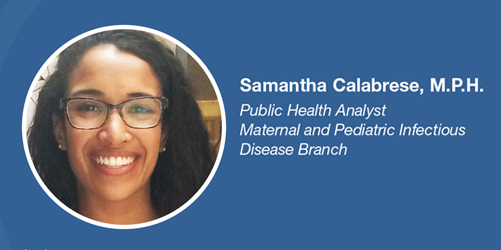How did you become interested in science and research?
 As a kid, I grew up in the beautiful “Green Mountain State” of Vermont. In high school, I participated in the Governor’s Institute of Vermont Environmental Science and Technology Institute
As a kid, I grew up in the beautiful “Green Mountain State” of Vermont. In high school, I participated in the Governor’s Institute of Vermont Environmental Science and Technology Institute 
What brought you to NICHD?
During a discussion with a high school teacher, I’ll never forget being asked, “Where do you see yourself in 5 years?” There was a moment of pause. At the time, I was just starting college at the University of Massachusetts Amherst, pursuing a bachelor of science in the public health sciences. My answer: the National Institutes of Health. After college, I landed an internship in the Office of Intramural Training and Education Summer Internship Program (SIP) at the National Human Genome Research Institute. I spent the summer using social network methods to understand intergenerational familial disease risks. Following my SIP, I applied for various jobs across NIH, including extramural NIH. I was lucky enough to join the NICHD Division of Extramural Research (DER) family as part of the Maternal and Pediatric Infectious Disease Branch (MPIDB) in 2016, supporting domestic and international research, training, and career development programs in HIV and other significant infectious diseases.
What types of training, experiences, or traits are essential for success in your position?
Success can be defined in many ways. As an analyst, the approaches and methodologies I apply as part of my daily work are constantly evolving. Trainings in data science, policy, clinical trials, and biomedical and behavioral research broaden my abilities to relay the tools I use to the needs of others and support scientific advancements. Knowing the data, considering alternative perspectives, and relying on my colleague’s expertise are also critical to my role in serving the scientific research community.
What do you find most valuable about working at NICHD?
“Welcome to the family” is something you hear often at NICHD. One of the most valuable components of the NICHD family is the diversity of perspectives working together to improve the health of women, children, families, and those living with intellectual and developmental disabilities. Collectively, we share an appreciation of the science and research, which is immensely rewarding. There is never a dull moment.
Can you explain your job to people who are not familiar with scientific positions outside of a laboratory or clinical setting?
As a public health analyst, I wear many hats to drive progress in biomedical research through the scientific enterprise we support. At the core, my work is using data to inform the science. Through data, I contribute to NICHD's various goal-setting efforts across research priorities, scientific programs, and program areas. These data and analyses point to gaps and opportunities for NICHD to lead or work collaboratively and cross-disciplinarily to accomplish our mission and vision of “health pregnancies, healthy children, healthy and optimal lives.”
If you have advanced along your career within the institute, can you summarize your career steps and how you successfully navigated these changes?
I have worked in MPIDB as the lead public health analyst for 6 years. My career has progressed in a logical manner from my undergraduate to graduate education in public health. From my first day at NICHD to the present, not only have my responsibilities and workload grown, but so has my visibility at NICHD and NIH. During this time, I became aware of various doctoral programs and was encouraged by colleagues to pursue my passion for environmental health and health security. I am now entering my third year in the Doctor of Public Health Program 
What advice can you offer to people who are at an earlier stage of their career?
Talk to people and reach out. Conversations are not only fulfilling but also ways to build your social network (and that isn’t just my social network experience talking). Hearing firsthand from those who are the boots on the ground, the minds behind the screens, the voices on the phone, and these days, the Hollywood tiles of Zoom, provided some of the best early career advice, guidance, and mentorship. Don’t be afraid to ask questions, no matter how big or small—it will help you grow the necessary confidence to navigate challenges in the workplace.
Return to Get to Know NICHD.
 BACK TO TOP
BACK TO TOP